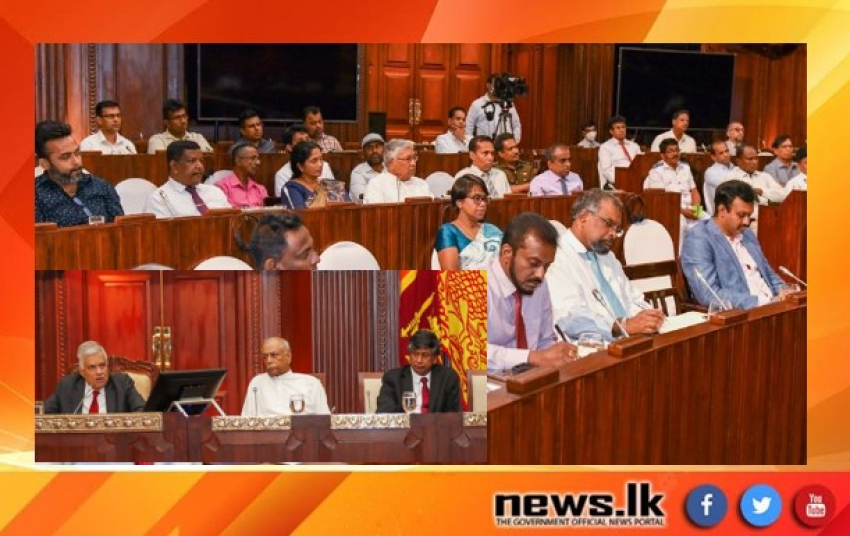President Ranil Wickremesinghe emphasized the need of working within one policy framework by all while facing the economic difficulties the country is confronted with.
The President made these observations during a meeting with the trade union representatives at the President's Office held yesterday afternoon (13).
Government, semi-government and private sector trade union leaders and representatives participated in the meeting which was presided over by the President and the Prime Minister to discuss the corrective measures that could be taken to find solutions to the economic and financial crisis existing in the country.
President Ranil Wickremesinghe further stated that the government has succeeded in making the negotiations with the International Monetary Fund more successful by being able to build trust as a country.
Stating that the country's economy is expected to improve after the first quarter of this year, the President expressed his confidence in achieving better economic progress in 2024.
The President pointed out that not only the public sector but the private sector should also be strengthened to provide relief to the people while continuing with the development programs of the country.
President Ranil Wickremesinghe further said that he is aware of the hardships the people are going through today and added that he would somehow provide relief to the public.
The President also pointed out that measures have been taken to provide rice to about 2 million families who are not entitled to Samurdhi benefits during the months of March and April.
The statement made by President Ranil Wickremesinghe is as follows:
“We are well aware that the economy of the country has collapsed. So I know the difficulties faced by the country. We witnessed a drop in the number of employments. Inflation has especially increased the cost of living. Hence people's lifestyle is changing. The facilities that the people enjoyed earlier are diminishing. This situation has affected every field including education and health. These are the repercussions of this economic collapse. It is useless to talk of the root causes for these issues as they have already happened.
The only option we have now is to seek the support of the International Monetary Fund (IMF). Otherwise, we cannot recover. Hence we must decide if we are to get their support or remain stagnated in this collapsed economic situation. My attempt is to reinvigorate the collapsed economy of the country.
We are currently carrying out a debt restructuring program. We have already completed the negotiations with Japan which is one of the three main countries, Japan, China, and India from whom we have obtained loans.
We discussed with China's EXIM Bank this week and by now we have commenced exchanging views on it. India's Foreign Minister is scheduled to visit Sri Lanka on the 19th to discuss the debt restructuring process. We are proceeding with these activities gradually.
Following these negotiations, we will receive USD 2.7 billion from the International Monetary Fund (IMF) in three or four instalments. In addition, we have the capacity to get USD 5 billion from the World Bank, the Asian Development Bank etc. In addition, by the end of the year, a number of different programs are scheduled to recommence with Japan. Hence, we should keep on continuing these activities.
Additionally, we have one more problem. In the Global sphere, the economic growth in Europe and America is now slowing down. Under such a situation, our export market may drop by next year and we have to develop our tourism industry.
We would be able to increase the Inland Revenue by the end of this year. Then some relief could be given to the people. However, before that, the country's economy should be strengthened where not only the public sector but the private sector as well. Otherwise, there would be a gap.
First, we need to find out what relief could be given to the people. We have made allocations to provide rice to about 2 million families, in March and April, who are not entitled to Samurdhi benefits.
In this month of March and April, we have allocated 10 million rupees to provide 10 kg bag of rice to about 2 million families who are not entitled to receive Samurdhi benefits. We are hopeful that the country would achieve a comparatively better economic situation following the first quarter of this year. By 2024, we can achieve the expected growth rate and until then, everyone has to face these difficulties.
Working people and small-scale entrepreneurs are facing the highest difficulties among people today. Problems have arisen in both public and private banks as well. We must protect the banking system and when they are protected, small-scale entrepreneurs borrowing from such banks could collapse. What is the next step then? How should the economy be managed from 2024? The export economy should be strengthened by protecting the competitiveness of businesses. Similarly, concessions should be given to the working people.
I suggest that not only the public sector but also private businesses, marketing boards, trade unions, farmers, and all should discuss lengthily and at least reach a framework of a social agreement on how we can advance this economic program.”
The statement made by Prime Minister Dinesh Gunawardena is as follows:
Owing to the measures taken by the government in the last few months, the economic situation of the country is changing to some extent. But in order to strengthen the situation in the future, we need to cooperate and improve the products and services. It is on that basis that we can raise our heads as a country and the participation of working people in that endeavour is of paramount importance.”
Union leaders and representatives also spoke at length while President's Secretary Saman Ekanayake, Finance Ministry Secretary Mahinda Siriwardena, President's Senior Economic Adviser Dr. R.H.S. Samaratunga, President Trade Union Director General Saman Ratnapriya and other officers attended the discussion.
President’s Media Division (PMD)



















